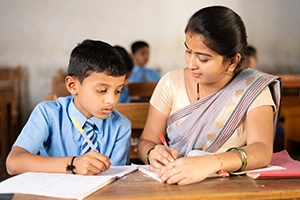Excelling in Classes 6 to 8 requires concept clarity, skill development, and proper academic guidance. Sulekha connects students with experienced tutors who provide personalized coaching in Mathematics, Science, English, and Social Studies. Our tutors ensure students build a strong foundation for high school subjects through structured learning and step-by-step guidance.
With thousands of verified educators and coaching centers, students can access customized learning programs suited to their pace and academic goals. Whether you prefer in-person tutoring, online classes, or small group sessions, Sulekha helps you find the best tuition for academic improvement and confidence building.
Find top-rated Class 6 to 8 tutors who offer structured coaching to enhance academic performance and confidence.
Sulekha makes it simple to find the best tuition classes for Classes 6, 7, and 8 to enhance subject understanding and prepare for future academic challenges.
Tuition costs vary based on subjects, tutor expertise, and learning mode (individual/group). Factors like personalized coaching, batch size, and online or offline classes also influence the overall fee structure.
|
|
Average Tuition Cost (Per Month) |
|---|---|
| Mathematics | ₹1,500 - ₹4,000 |
| Science | ₹1,800 - ₹4,500 |
| English | ₹1,200 - ₹3,500 |
| Social Studies | ₹1,2500 - ₹3,000 |
| Online Coaching | ₹1,500 - ₹3,800 |
| Crash Course | ₹4,000 - ₹7,000 |
| Home Tuition | ₹5,000 - ₹9,000 |
Enhance your learning with structured coaching programs designed for Classes 6 to 8. Get in-depth subject coverage, expert guidance, and interactive lessons for better understanding.
| Subject | Topics Covered |
|---|---|
| Mathematics | Algebra, Geometry, Fractions, Decimals, Data Handling. |
| Science | Physics, Chemistry, Biology – Fundamental Experiments & Concepts. |
| English | Grammar, Reading Comprehension, Creative Writing. |
| Social Studies | History, Geography, Civics, Economics. |
| Crash Course | Quick Revision, Problem-Solving Techniques, Exam Preparation. |
| Advanced Learning | Conceptual Clarity for High School Subjects. |
Mathematics and Science are the two main subjects for which students from Class VI-VIII require tuitions. As both these subjects involve several core concepts that students have to thoroughly understand to be able to face challenges beyond Class VIII, they are the two top subjects that require students to enroll in tuition centres or opt for home tutors. English is also a subject that students require tuitions for. English has become a global language and developing basic communicative skills is now considered essential all over the world. During the years of middle school, students can take tuitions for English along with Math and Science to brush up on their grammar skills. Learning how to read, write, speak in and listen to English also enables candidates to understand their textbooks better, as all textbooks in English-medium schools are in English. English tuitions for VI-VIII classes also encourage candidates to start framing their own answers, which rids them of their dependence on mugging up content without understanding.
Students and their parents are requested to get in touch with the Sulekha-listed tuition centres and tutors to get an exact idea regarding the tuition fees charged by them.
No. With enough practice and preparation at home on your own, you have every chance of doing well in your final examinations across Class VI-VIII. However, if you have experienced a dip in your academic performance or can’t seem to grasp concepts clearly, you should definitely consider tuitions.
